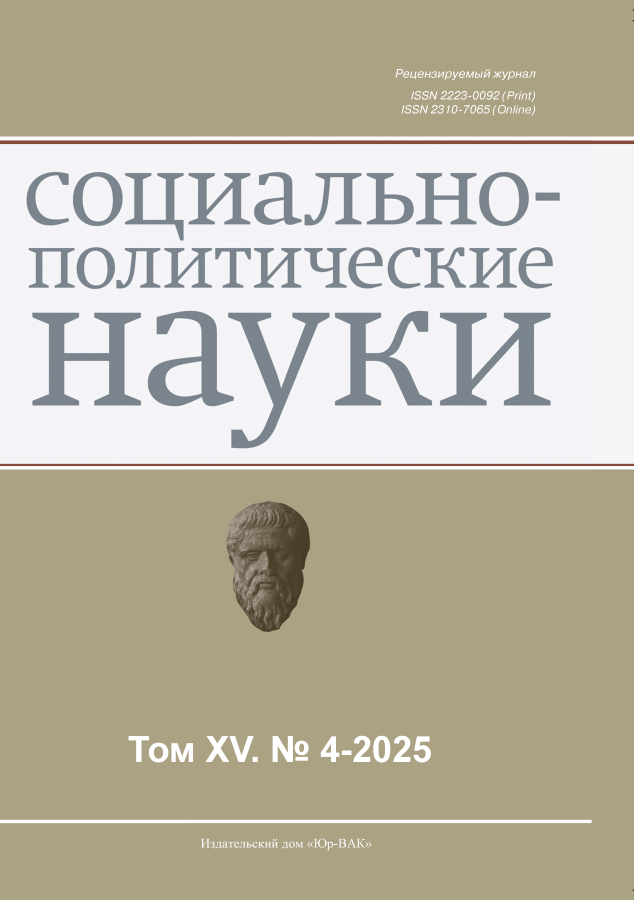Categorical distinction between freelancing–self-employment–entrepreneurship in the study of shortened working week: a methodological aspect
- Autores: Chaplashkin N.V.1, Grigorovich E.V.2
-
Afiliações:
- Center of Education Development and International Activities (“Interobrazovanie”)
- Financial University under the Government of the Russian Federation
- Edição: Volume 15, Nº 4 (2025)
- Páginas: 263-272
- Seção: Sociology of management
- URL: https://journal-vniispk.ru/2223-0092/article/view/348455
- DOI: https://doi.org/10.33693/2223-0092-2025-15-4-263-272
- EDN: https://elibrary.ru/XTPDAF
- ID: 348455
Citar
Resumo
The article suggests that the study of the concept of introducing a shortened workweek should be conducted in the context of studying freelance employment. This approach will allow us to form a holistic view of labor market development trends and the impact on demand for flexible forms of traditional full-time employment, including a four-day workweek. In order to understand the motives of workers to switch to freelance employment, the authors of the work try to analyze how the concepts of “freelancing”, “self-employment” and “entrepreneurial activity” are related, and which form of employment is closer to freelance employment. Despite the attractiveness of these forms of employment, they cannot always satisfy the labor needs of all categories of workers, especially those who lack an “entrepreneurial streak” and who are afraid of “free floating”. Currently, both self-employment and freelancing have a significant share of part-time workers with their main activity. At the same time, the analysis of the size of income allows us to say that some workers use both self-employment and freelancing as a side job to their main income, or as a side job for those temporarily unemployed. The results obtained indicate that they are not promising enough as a main type of work. Unlike working for yourself, a four-day work week ensures income stability in the form of a fixed salary and the preservation of social guarantees. In this regard, in the context of a personnel shortage, it is advisable for employers to consider the introduction of a four-day work week as a tool for optimizing labor resources. The introduction of a shortened work week can also attract some freelancers and self-employed people to employers.
Texto integral
##article.viewOnOriginalSite##Sobre autores
Nikolay Chaplashkin
Center of Education Development and International Activities (“Interobrazovanie”)
Autor responsável pela correspondência
Email: kalyan82@rambler.ru
ORCID ID: 0009-0004-8282-1909
Cand. Sci. (Sociol.), 3rd class Active State Councillor of the Russian Federation, Advisor to the General Director
Rússia, MoscowElena Grigorovich
Financial University under the Government of the Russian Federation
Email: evgrigorovich@fa.ru
ORCID ID: 0000-0003-3916-9906
Cand. Sci. (Law), associate professor
Rússia, MoscowBibliografia
- Aborkina E.O. Analysis of the prospects for changing the duration of the working week. In the Center of the Economy. 2022. No. 3. Pp. 105–110. (In Rus.). EDN: QZUHYF.
- Berseneva N.V., Geiko V.V., Melnik P.I. Legal status of a freelancer in the Russian Federation. Conflictology. 2020. Vol. 15. No. 4. Pp. 92–99. (In Rus.) EDN: CJFGVH.
- Bechtel M. The future of work: Reflections, views, prospects. Inter Nationes, 2000. 19 p.
- Burlutskaya M.G., Kharchenko V.S. Freelancers: Specifics of social status, career strategy and professional development. Journal of Sociology and Social Anthropology. 2013. Vol. 16. No. 1. Pp. 111–123. (In Rus.). EDN: PYBKOZ.
- Vorotynskaya A.M. New forms of employment and information security. Journal of Legal and Economic Studies. 2020. No. 1. Pp. 5–9. (In Rus.) EDN: DRLAAE. doi: 10.26163/GIEF.2020.25.54.001.
- Demchenko K.V. Issues of tax optimization of self-employment (freelancing). Modern Scientific Research and Development. 2018. Vol. 1. No. 4 (21). Pp. 184–186. (In Rus.). EDN: VMUXXT.
- Zabelina O.V., Mirzabalaeva F.I. Freelancing as a new flexible form of self-employment in the Russian labor market. Labor Economics. 2020. Vol. 7. No. 4. Pp. 307–320. (In Rus.). EDN: GNHDVC. doi: 10.18334/et.7.4.100869.
- Keynes D.M. Economic opportunities for our grandchildren. Voprosy Ekonomiki. 2009. No. 6. Pp. 60–69. (In Rus.)
- Malone T.W. Labor in the new century. How new forms of business affect organizations, management style, and your life. Transl. from English. Moscow: Olimp-Business, 2006. 272 p.
- Nikutkina K.M., Privalova A.O. Western quantitative studies of freelancers: A professional review. Economic Sociology. 2009. Vol. 10. No. 1. Pp. 127–143. (In Rus.). EDN: OYNXKF.
- Pink D. Free agent nation: How new independent workers are changing american life. Transl. from English. Moscow: Secret of the Firm, 2005. 328 p.
- Raldugina A.O. Flexible forms of organization of personnel labor: Freelancing and remote employment. E-Scio. 2021. No. 8 (59). Pp. 186–195. (In Rus.). EDN: TDKEFK.
- Strebkov D.O., Shevchuk A.V. Freelancers in the information economy: How Russians are mastering new forms of organization of labor and employment (based on the results of the first All-Russian census of freelancers). Moscow: Publishing House of the HSE University, 2009. 76 p.
- Strebkov D.O., Shevchuk A.V. What do we know about freelancers? Sociology of free employment. Moscow: Publishing House of the HSE University. 2022. 528 p. EDN: GYGZLX. doi: 10.17323/978-5-7598-2722-1.
- Handy C. Time of recklessness. The art of management in the organization of the future. St. Petersburg: Piter, 2001. 275 p.
- Chaplashkin N.V. Freelance as a new social phenomenon and its consequences. Dis. … Cand. Sci. (Sociol.). Moscow, 2013. 206 p. EDN: SUXQBB.
Arquivos suplementares









